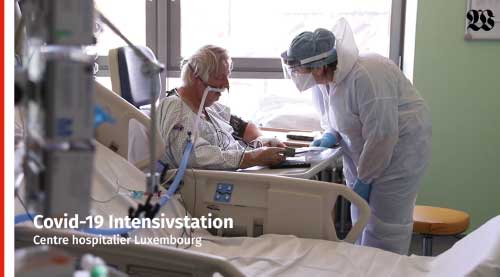Roland Arens
Editor-in-chief Luxemburger Wort

The Luxemburger Wort, market leader in Luxembourg, is the most important quality newspaper for local, national and international news. In addition to the traditional daily newspaper sections, Luxemburger Wort also publishes dossiers, in-depth analyses and exclusive news.
www.wort.lu
Founded
1848
Daily readership print
136.800 Luxembourg residents
Daily readership online
98.100 Luxembourg residents
Number of subscribers
(print + digital) 49.536
Journalists employed
60
Journalists from the Luxemburger Wort are using multimedia reporting to document life in quarantine and the daily struggle against the disease.

Like many other publications, the Luxemburger Wort has reported on the overwhelming events since March 2020: impromptu press conferences, heated parliamentary debates, the lockdown, the infection rates, the number of new cases and number of deaths. We recorded the most important news as it happened in the live ticker and used drones to illustrate the empty cities and streets during lockdown. Our main concern was to show how Covid-19 has changed people’s lives. But when words are unable to describe reality, it is sometimes better to let people and images speak for themselves. The Luxemburger Wort has been experimenting for a while with multimedia narrative formats, called storytelling, which we also regularly use in our coverage of the pandemic.
These are carefully selected stories, as well as photos, graphics, original sounds, videos and other interactive elements that, depending on the subject, are combined in a variety of compositions. Over the past few months, a whole series of multimedia reports came into being, documenting life with Covid-19 and the fight against the pandemic.
Storytelling requires teamwork in every area of the virtual newsroom. Working with the journalists from the specialist departments, the web editors are responsible for the online presentation of their research. Our data journalists dig through massive amounts of data, filter it to find the most valuable information and translate it into a bite-sized, understandable form for the reader. Our video journalists make the stories tangible with moving images and animations.
In April, the Luxemburger Wort published a first video report from the Covid-19 frontline in the intensive care unit of the Centre Hospitalier de Luxembourg, one of the larger hospitals in the capital. “The doctors and nurses trusted me, I could work freely,” video journalist Sibila Lind says about the recordings that were as complex as they were poignant. “For me, as a journalist, the question arises: how can I paint a picture of this reality without violating the dignity of the often very sick people?”
Another video report, called “No breather at U33”, the hospital’s Covid-19 ward, was produced with very short texts and impressive black-and-white photographs and video clips. The photos were deliberately taken in portrait format, to ensure the story could be optimally watched on mobile phones.
The editorial team’s view was that the storytelling reports should provide a counterweight to the official reporting. “Our approach is aimed at setting our own journalistic language against the over-formatted messages by the government,” says video journalist Christophe Olinger. A stylistic feature of our video interviews is that the focus is on the people we are observing. The camera does not move, there are no interview questions and as such the interviewees’ testimonies can have their full effect.
We have also tried to incorporate readers and their daily lives in quarantine into our digital coverage. As early as March, we showed video interviews with people infected with Covid-19, we published a collection of private photographs and drawings of grandchildren for grandparents they were not allowed to visit, and students wrote their own texts about life with Covid-19. The young people all agreed on one thing: “We are so fed up with this virus!”